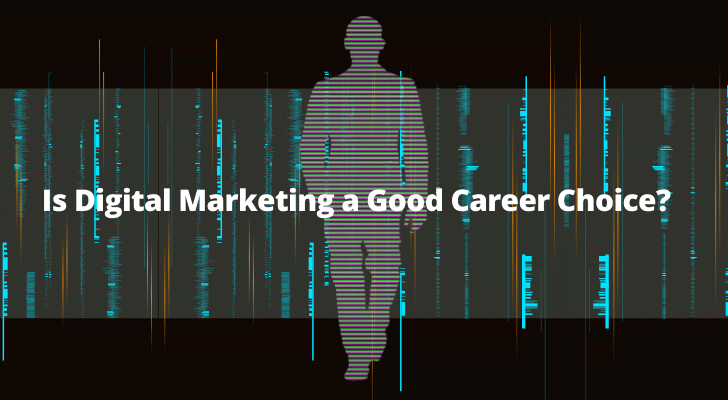The term "digital marketing" is slipping into obsolescence, if not already dead. I mean, isn’t it rather harder to find a marketing job that doesn't involve any kind of digital media? And the term is so broad, too. Anyone could posts ads on social media and the next minute call themselves a digital marketer. Digital marketing is a good, decent career to pursue, right? What kind of knowledge and skills are required? Here’s what I know.

What Really Is Digital Marketing?
If someone told you that they are a digital marketer, you would probably ask them for clarification - what they actually do and what kind of industry they are in. Roughly speaking, there are three different types of digital marketing careers;
1. As an Employee
People who work for a large enterprise are likely to have a more specific title rather than “Digital Marketer”, for example;
- "Email Marketing Specialist"
- "Online Brand Ambassador"
They cover one area of marketing methods, spend according to the budget, and report to their senior such as “Chief Marketing Officer/Director.”
2. As a Consultant
Digital marketing consultants help businesses grow by planning strategies, setting up the foundations, running campaigns on their behalf, and giving them advice. They may either work as a freelancer or they may be contracted to a company.
As I said earlier, the term “digital marketing” is so broad. Consultants are usually specialized in one area of expertise and identify themselves accordingly, e.g. “Social Media Marketing Consultant”. Otherwise, they’re expected to have an all-around knowledge and skillset of marketing online.
3. As a Business Owner
Any self-employed person whose main focus is marketing might call themselves a (digital) marketer. In other words, anyone who doesn’t have their own creations to offer are likely to be a marketer.
My job as an affiliate marketer is a typical example. Most of my monthly income comes from affiliate commissions for selling other people’s products. My main activities are for marketing purposes, so I could say I’m a full-time digital marketer.
So inevitably, self-employed, self-proclaimed digital marketers are also required to have a broader range of knowledge, whether they handle it all themselves or delegate some tasks to others.
What Types Of Digital Marketing Methods Are There?
Okay, as if you don't know. But let's recap this, anyway. Here are the typical methods that digital markers cover. They should be at least specialized in some of the following areas, and with all the other areas, they should have a basic understanding, at least.
- Content marketing - writing
- Content marketing - video
- Search engine optimization
- Website building
- Email marketing
- PPC (pay-per-click) marketing
- Social media marketing
If you’re just starting up your own digital marketing career, you will learn how each one works at some point in the future. No need to master all of the skills, but it'll be worthwhile to familiarize yourself with them all so that you can determine what combination of methods works best for you.
I’ll elaborate on this one in a little while.
Is It Worth Getting a Master's Degree in Digital Marketing?

Yes, I think it's worth considering if you are interested in working in a marketing field more than anything else and are determined to work for a top company.
Whatever job you apply for, wherever you go, you do need to demonstrate some kind of credentials to pass a job interview, don’t you? Either a qualification or a solid experience (or both!) If you have no experience, a college diploma should improve your chances of getting hired.
At a college/university, you’ll be learning digital marketing for up to 4 years, so not just the variety of techniques that I mentioned earlier, you'll be developing into an elite professional at a corporate level through courses such as;
- Buyer psychology
- Global consumer engagement
- Brand management
- Customer relationship management
- Tackling major projects (bigger budgets, work in partnership with other companies)
- Professional development for marketers
- Marketing ethics and social responsibility
As you are probably aware, university tuition is expensive. Collegedunia says that it will cost you anywhere between $23k - $76k to get a master's degree in digital marketing. Applying for private student loans is one option - they’re designed especially for students, so usually offer low-interest rates, they let you skip for a year and don’t charge extra fees, so it might be worth looking into.
Can I Learn Digital Marketing Techniques At Home?
Of course, you can. You can find a wide range of online digital marketing courses, most of which are in a combination of video and text format. The tuition fees vary depending on what they teach and the volume of the course program. If you’re looking to run your own marketing business online, then it will only make sense that you learn everything online. Needless to say, the experience you gain working from home will serve you well if you ever wish to obtain a position as a digital marketer at a corporate in the future.
Here are some of the main skillsets you can learn at home online;
- Website building/designing, content writing, and SEO (Search Engine Optimization) - To rank on search engines and drive organic traffic, which means that the audience will find your site on Google and visit.
- Landing page and sales funnel building and copywriting - To promote a specific product, or multiple products, and write sales copy that will convert a certain group of people.
- Paid advertising methods - PPC (pay-per-click) such as Google Ads and Meta Ads, and solo ad traffic services.
- Lead generation and email marketing - To build a list of subscribers and send email campaigns regularly.
- Video marketing - To use YouTube, TikTok, and Instagram to create content.
- Social media marketing - To post content on social networks (this can overlap with paid advertising methods and video marketing.)
- Analytics - Visitor numbers, behaviours, conversions, and geotargeting.
Like I said earlier, you won’t have to have all the skills, but you’ll have to have at least a few of the above. For example, if you can drive organic traffic through content writing, SEO will be a must, but you won't need to use PPC ads.
Although in reality, it‘ll take you a long time before you can start generating a full-time income by solely relying on organic traffic. For that very reason, some marketers who look to earn short-term income focus only on paid traffic and email marketing. SEO skills aren’t necessary for those marketers, you know.
Short-Term and Long Term Goals For A Digital Marketer

A marketer’s job is to promote a business, right? So your primary objective should be to generate wealth for the business owner - if you work for yourself, that's you. And your secondary objective is to get yourself recognized for your success as a marketer.
In other words, there’s a short-term goal and a long-term goal to achieve, which may appear to be quite opposite each other.
Short-Term Goal
You're just a marketer, why should you care who you are? As long as you make the business owner happy, it pays you.
Your good copywriting technique on a sales page will generate money. Your analysis will help generate more money. This is an ongoing demonstration of your marketing skills.
Long-Term Goal
People should care who you are and your marketing skills need recognition.
So you develop yourself as a brand marketer. Like an influencer. Use your personality, be helpful to users (buyers) and gain trust, which will ultimately generate more money.
Marketing Is Only Marketing
With all that said, this is a trap that new online marketers often who work for themselves fall into. They’re so focused on marketing skills and overlook the actual quality of the product they promote.
No matter how good your sales copy is, if a product is of inferior quality, then you are practically cheating users.

I mean, we’re all misled by marketing tactics and end up wasting money on a useless product from time to time. We claim a refund if it’s too bad. We even call it a scam and tell others not to buy it on Twitter.
Then why would you spend 100% of your energy learning consumers’ pre-purchase psychology and all, only to keep promoting less-than-great products?
I’ve seen a lot of (literally hundreds of) digital marketers promote random products one after another. It's clear they're only aiming for short-term profits instead of building trust with their, dare I say, audience.
Marketing is only marketing - priority should always be given to quality, then to selling strategy. I think it’s important to find a product a two that you absolutely believe in first. Without it, your efforts won't be justified right in the long run.
Is Digital Marketing a Good Career? Pros and Cons
I can think of a few advantages and disadvantages of a digital marketing career.
Pros
- Good salary - The CollegeDunia site that I’ve mentioned says that the job could let you earn as much as $65+ per hour. The figure may be for a higher-level role, but it is good, isn’t it?
- Location independence - You can work from anywhere. Well, in theory.
- Flexible hours - You can work yourself and control your working hours all by yourself. That’s not possible with some other business models (e.g. e-commerce working hours are determined by customer orders, delivery time, etc.)
- Useful in the future - In case you set up a new business in the future, your marketing skills will come in handy, saving you from having to hire a marketer.
Cons
- No brand - A full-time marketing job is about promoting someone else’s brand on their behalf. Not having your own products/services to offer might start making you feel unfulfilled at some point in the future, unless you make yourself known as a trustworthy, brand marketer.
- Competitive - The demand for marketing specialists is high across all business types. But the fact is, even a higher number of applicants for vacancies - if you look at the digital marketing job listings on LinkedIn, you can tell how competitive the job market is.
Is Digital Marketing a Good Career Choice?
Yes, I think it’s as good as it’s always been. Let's close by reminding ourselves of this. The exact stats aren’t available, but if you look at the trends worldwide, It’s clear that millions of individuals must search for side hustle ideas and start affiliate marketing everyday. It’s competitive. It’s not as easy as some of those work-from-home startups think. So it’s important to have a long-term vision.
If you wish to work as a marketing specialist, you know now that what you want to do has got to be a little more specific. But a lot of learning opportunities are available online, so I suggest that you start for free, and keep going until you find which areas most interest you.
What Do You Advocate?


Hi Ray, thank you for such an interesting article. I’m so intrigued, as we all hear the words digital marketing on a daily basis, but I think it’s true the words are outdated. I think a lot of Indian people still use the term especially in job advertisements since half of the population does not have access to the internet. In India, you say that you know digital marketing to indicate that you are in the top half, so you have more chances to get jobs, even as a non-digital job like receptionist, hotel & catering.
It’s good to learn about the short-term goal and the long-term goal of digital marketing. I agree with you 100% about being helpful to users and gain trust, this makes me realize that I need to focus on the both aspects to make money continuously. Thank you for the helpful advice. Have a good day.
Hi Hitesh, thanks for your comment. Good to know how the term “digital marketing” is still being used in India, so it’s not totally dead in some parts of the world then! Thanks for sharing your thoughts too. All the best.